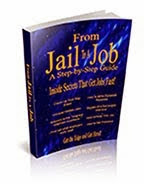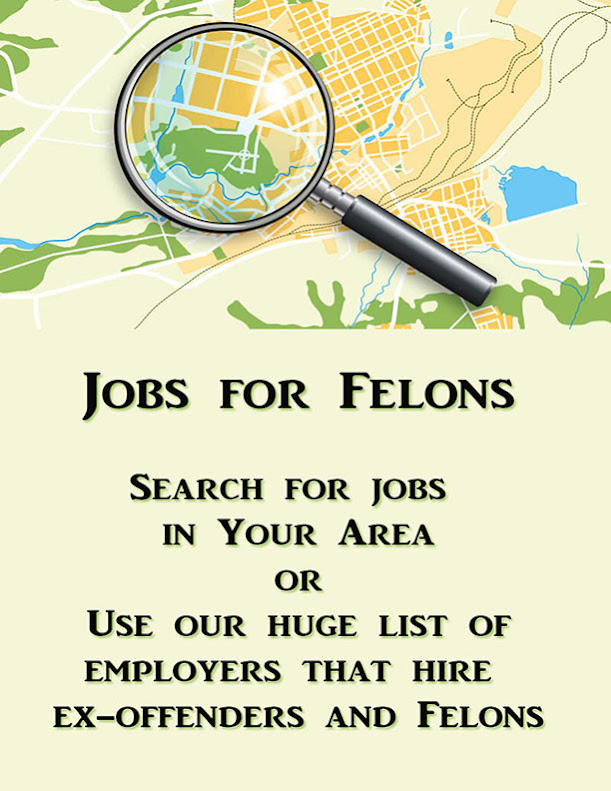How Felons Can Land Jobs Today
Finding a job in this day and age is different than it was even five years ago. The computer age has changed the way we look for and apply for jobs. Felons looking for jobs face different challenges than other job seekers. By using some different techniques, felons can dramatically increase their job opportunities. Take a look at these tips and your next job will not be far away.
Get out and Network
Asking people you already know about jobs that may be open is called networking. This is the single most powerful way to get job leads. In fact, most people get their jobs this way. Networking is works so well because many employers will take a good a look at people who are referred to them.How many categories of people do you know? This a big group of people who can provide you with a lot of quality job leads.
Friends
People in the neighborhood
 Parole/probation officers
Parole/probation officersRelatives
Members of your worship group (especially religious leaders)
Former co- workers
Other Former Inmates
Former teachers
Former employers
Classmates
Casual acquaintances
People you do business with (Barber, landlord, doctors)
This is eleven categories of people. Let's say you got five job leads from people in each category. That is a possible 55 high quality leads for jobs. That would be a great start for your job search. This the single most powerful way to get a job and it how most people find jobs
Get a Professional Looking Email
Your email address should have a professional look. Employers will probably take more seriously if you have a professional looking email address. You may want to one that uses your first and last name separated by a period, followed by the two numbers of your date of birth ex: richard.jenkins21@mail.comClean Up Your Social Media
 |
| Clean up your social media |
who they are considering. So take a good look at your social media profile or page. Is there anything that leave a bad taste of an employer's mouth? You may want to remove it. That means any objectionable pictures, posts or videos.
Apply for Every Job You are Qualified for
Get Professional Looking Interview Clothing
The choice of clothing you wear to an interview will have a huge impact on your chances to get hired. Remember you are not going to a nightclub or a party. An interview is a business meeting and you should look like you are ready for business. Your clothes will create an image or perception of the type of person you are, so choosing your look is critical to presenting yourself as a professional. It doesn't matter what position you apply for, you should present yourself as a professional.Men
Men should should wear a dark suit, a light shirt, a tie and shoes that can be shined. If a suit isunavailable, dark slacks, light colored shirt, a tie and once again, shoes that can be shined.
Women
The ideal look is a classic business suit (either slacks or skirt,) a light colored blouse and coordinated shoes with a medium or low heel. Earrings should be small. Nail polish and makeup should be natural looking and tasteful.Not everyone has clothing like described above, but it is important to get them. How you look will definitely influence an employer. If finances are an issue, you may want to look into thrift stores to find appropriate interview clothing. At thrift stores you will find suits, slacks, shirts, ties and shoes at very affordable prices.
Need Interview Clothes? Ex offenders and Felons Should try Thrift Stores
No matter where you find your clothing, clean and neatly pressed clothing will give you the professional look and help you make a good impression.
When looking for a job, dress like you are going to an interview
I encourage ex-offenders and felons to dress like you are going on an interview whenever you go out filling out applications. You never know who you are going to meet on your job search. It's always better to be prepared for an opportunity and not have one, than to have an opportunity and not be prepared.Make a list of your skills
Make a list of all of your skills and be able to talk about each one. Make a list your skills and practice talking about them. The better you can explain you value, the better your chances to get hired. The skills you should focus on are:Work-specific Skills
These are skills that were acquired by working at a particular jobs. Can you paint, cook, use tools or perform other types of work? The skills you used to perform on a job are all examples of work-specific skills.Transferable Skills
These are skills that can be taken from one type of job and used in other types of work. Typing, use of office equipment, and telephone skills are all examples of transferable skills.Personal Skills
These are skills that are part of your personality that helps you do other things well. Are you a punctual person? Do you work well under pressure? Do you work well with customers? These are all personal skills.These are three types of skills you can sell to an employer. If you can easily talk about your skills and how they can benefit an employer, you can get job, even with a criminal record
Follow Up
Follow up with everyone you meet on your job search. If you fill out an application, find out the name and phone number of the hiring person. If you get an interview, always get the business card of the person you interview with. The business card will have the interviewer's name, title, address, phone number and email address. Right after the interview, you may want to send a thank you email. If you really want to stand out, you could even send a thank you card.Get Good References
Having a few good references may be the difference that could get you hired. Have a list reputable who would say something positive about you make a list of five great references. A reference may look like this:
Mr. David O'Bannion
Vice President, Marketing
XYZ Company
922 N. Bank St.
Chicago, IL 60610
312-555-3222
References should never be included on your resume. They should be listed on a separate sheet and only be submitted upon request. Before you use anyone as a reference, you should ask their permission.
Use your One-stop Career Center
Every ex-offender or felon looking for a job should visit their local One-stop Career Center. You will find many resources that can help you find a job or get training for a new career. You may get personal assistance from trained employment counselors. You can get help writing a resume, learn interviewing techniques and find lists of open jobs in your community. Click this link to find your local One-stop Career Center One-stop Career Centers
Companies Hire Felons | Companies That Hire Felons | Companies That Hire Ex-offenders | Employers That Hire Ex-offenders | Employers That Hire Felons | Jobs For Felons | Jobs For Ex-offenders | Jobs That Hire Felons | Places That Hire Felons | Felon Friendly Jobs | Felon Friendly Employers | Jobs for Felons | Jobs For People That Have Felonies | Jobs For People With A Criminal Record | One-stop Career Center | Real Jobs for Felons
Eric Mayo


























